Every few decades, emerging technologies converge and yield a new suite of products and services. Just as a maturing Internet, affordable bandwidth, and ubiquitous smartphones yielded services such as Uber and Airbnb, the conditions are in place for artificial intelligence to go mainstream.
SAN FRANCISCO – Over the last 30 years, consumers have reaped the benefits of dramatic technological advances. In many countries, most people now have in their pockets a personal computer more powerful than the mainframes of the 1980s. The Atari 800XL computer that I developed games on when I was in high school was powered by a microprocessor with 3,500 transistors; the computer running on my iPhone today has two billion transistors. Back then, a gigabyte of storage cost $100,000 and was the size of a refrigerator; today it’s basically free and is measured in millimeters.
Even with these massive gains, we can expect still faster progress as the entire planet – people and things – becomes connected. Already, five billion people have access to a mobile device, and more than three billion people can access the Internet. In the coming years, 50 billion things – from light bulbs to refrigerators, roads, clothing, and more – will be connected to the Internet as well.
Every generation or so, emerging technologies converge, and something revolutionary occurs. For example, a maturing Internet, affordable bandwidth and file-compression, and Apple’s iconic iPhone enabled companies such as Uber, Airbnb, YouTube, Facebook, and Twitter to redefine the mobile-customer experience.

SAN FRANCISCO – Over the last 30 years, consumers have reaped the benefits of dramatic technological advances. In many countries, most people now have in their pockets a personal computer more powerful than the mainframes of the 1980s. The Atari 800XL computer that I developed games on when I was in high school was powered by a microprocessor with 3,500 transistors; the computer running on my iPhone today has two billion transistors. Back then, a gigabyte of storage cost $100,000 and was the size of a refrigerator; today it’s basically free and is measured in millimeters.
Even with these massive gains, we can expect still faster progress as the entire planet – people and things – becomes connected. Already, five billion people have access to a mobile device, and more than three billion people can access the Internet. In the coming years, 50 billion things – from light bulbs to refrigerators, roads, clothing, and more – will be connected to the Internet as well.
Every generation or so, emerging technologies converge, and something revolutionary occurs. For example, a maturing Internet, affordable bandwidth and file-compression, and Apple’s iconic iPhone enabled companies such as Uber, Airbnb, YouTube, Facebook, and Twitter to redefine the mobile-customer experience.